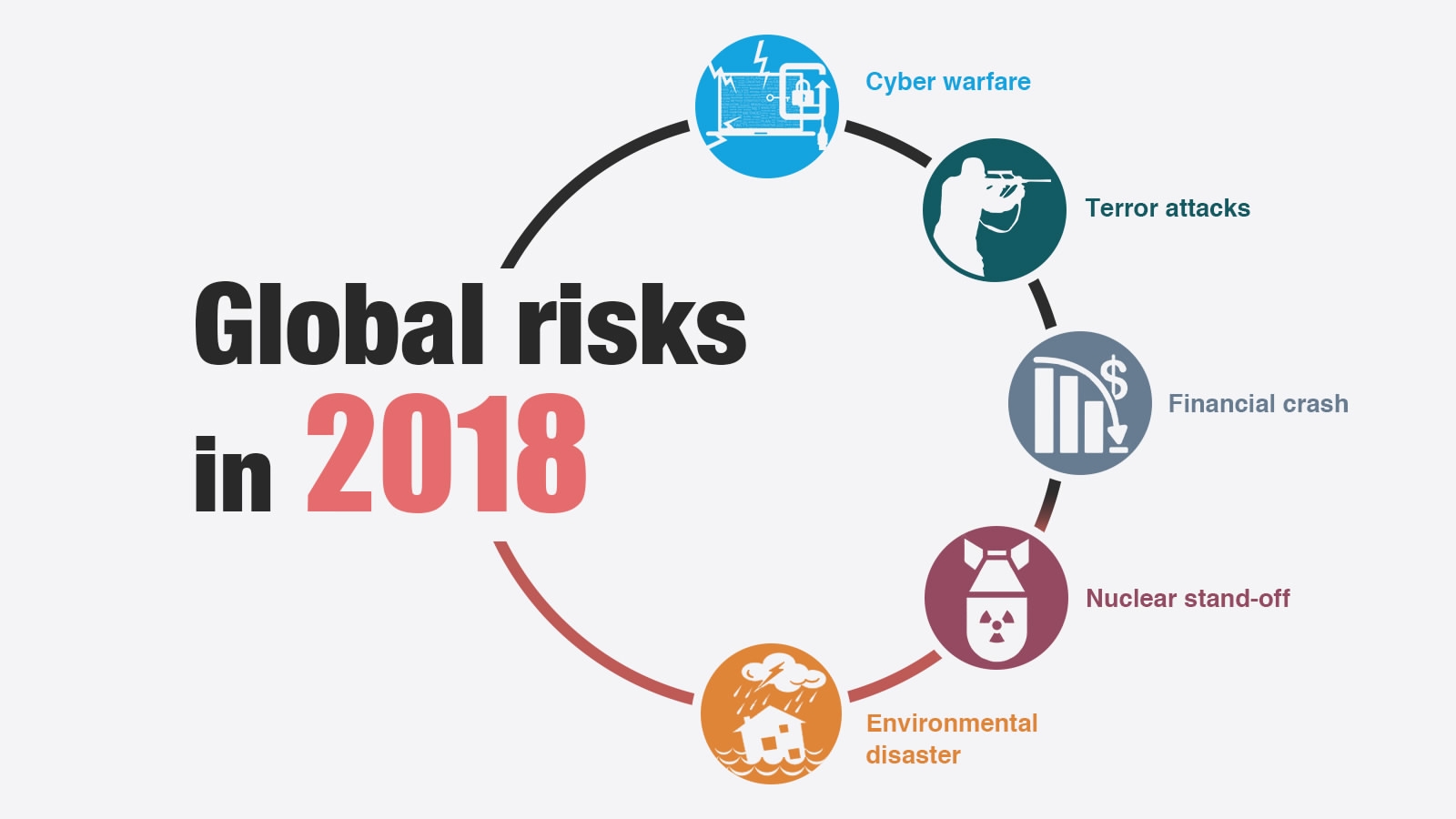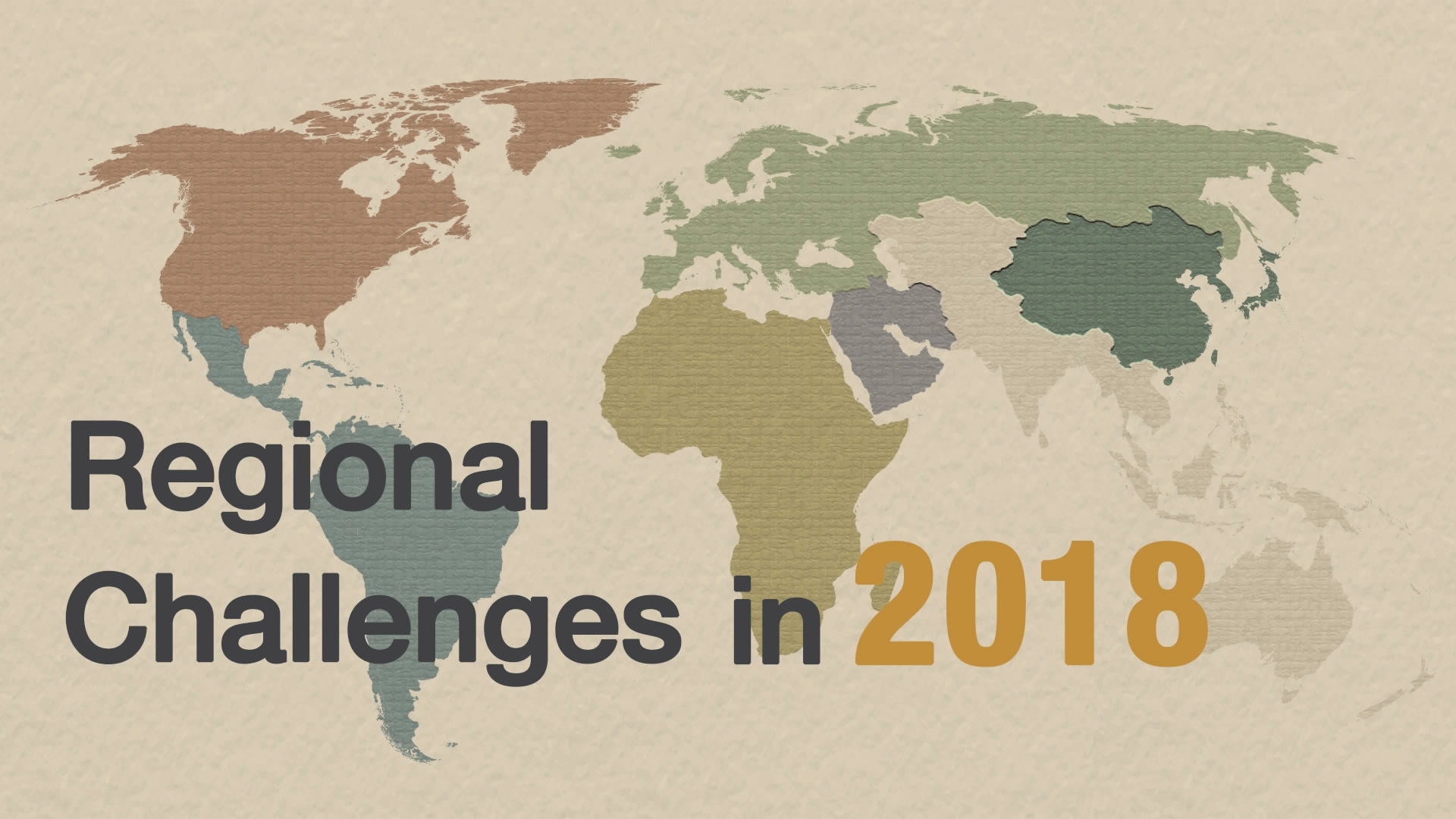
Politics
11:54, 02-Jan-2018
Global influencers: Politicians and diplomats to watch in 2018
Abhishek G Bhaya, Sim Sim Wissgott, John Goodrich
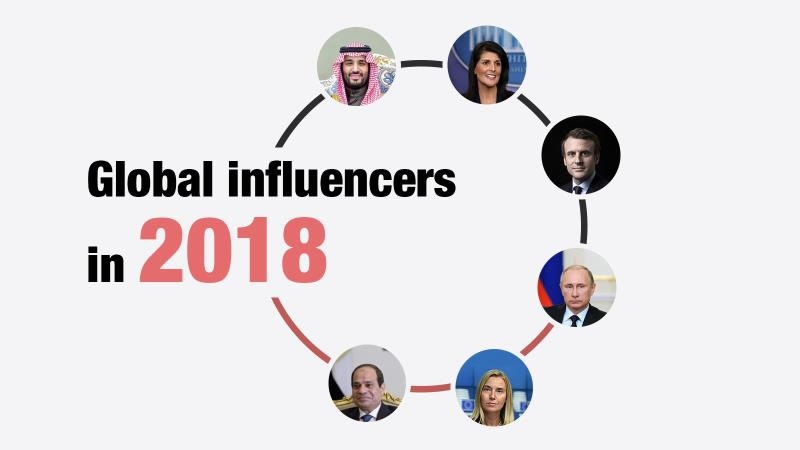
World leaders like Chinese President Xi Jinping and US President Donald Trump dominated the global stage in 2017, but a host of other players also carved out new and influential roles that are set to grow this year.
With an array of global risks and regional challenges to contend with in 2018, here is a quick look at these powerbrokers and the issues they may contend with over the next 12 months.
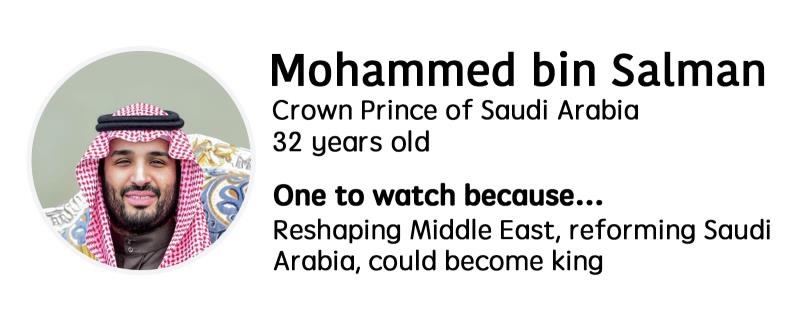
Popularly known as MBS, the 32-year-old is the power behind the throne of his father, King Salman – and could replace him in 2018. He became the world's youngest defense minister in January 2015, launched a military campaign in Yemen two months later, and was named heir apparent in June 2017. His anti-corruption drive in November 2017 led to the arrest of several high-profile Saudi princes and officials.
1. MBS’ aggressive foreign policy to counter the influence of regional rival Iran is seeing Saudi Arabia cozying up to Israel. This, along with the Saudi-led boycott of Qatar, will have repercussions across the entire region.
2. Under MBS’ Vision 2030 program, Saudi women will start driving from June 2018 and the kingdom will have choices of entertainment with the first movie theaters opening in March.
3. The 32-year-old envisions modernizing Saudi Arabia through a return of “moderate Islam” and aims to manifest that vision in the form of the NEOM transnational city and economic zone. Launched in October 2017 with an investment of over 500 billion US dollars, the colossal project is likely to draw global interest in 2018.
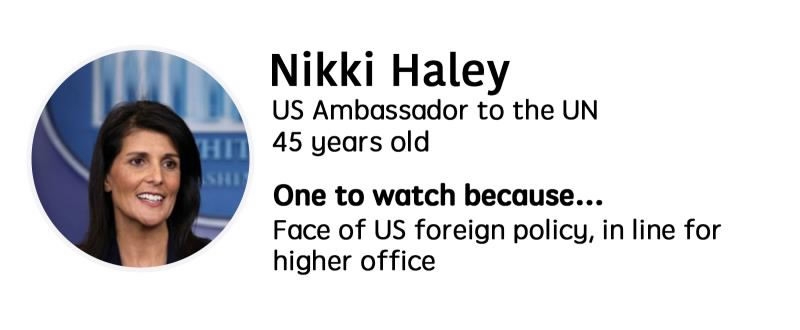
The former South Carolina governor, named US ambassador to the UN by Donald Trump, was the diplomatic face of US foreign policy in 2017 as Washington’s approach to Syria, Russia, the DPRK, Iran and Jerusalem dominated headlines around the world.
1. Haley looks set to be front and center of US foreign policy again in 2018, with none of last year’s big issues resolved and the possibility of fresh disputes ahead.
2. The 45-year-old is particularly hawkish on Iran, and has been heavily praised in conservative media for her criticism of the UN following the US decision to recognize Jerusalem as Israel’s capital.
3. She is long rumored to be planning a presidential run. At the UN, she has increased her profile and experience while keeping some distance from the Trump administration, including by calling for the women who have accused the president of misconduct to be listened to. But with uncertainty over Secretary of State Rex Tillerson’s future, Haley could be offered another chance to be the top US diplomat – having rejected the opportunity a year ago.
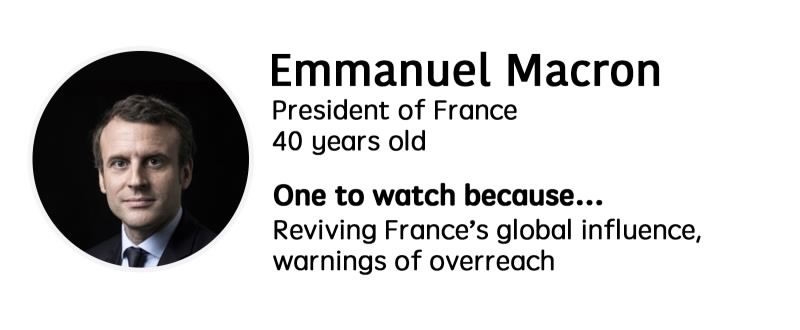
The 40-year-old was a political trailblazer in 2017, elected French president after creating his own party, taking advantage of disarray on the left and right of French politics to push through free market reforms with little resistance, and expanding his country’s global influence with prominent roles in the Middle East and Africa.
1. Macron moved into a void created by Britain’s retreat and the weakening of Angela Merkel in Germany, together with US isolationism under Trump, to play an increasingly active role on the global stage-that is expected to accelerate in 2018 with trips to Iran and Asia planned, including a state visit to China starting on January 8. However, military officials have warned that the president’s ambitions could exceed France’s capabilities.
2. After playing an integral part in resolving 2017’s Lebanon saga and attempting to recast his country’s reputation in Africa while battling militants in the Sahel, Macron is set to use a visit to Tehran to show France’s continued support for the Iran nuclear deal and possibly even offer to act as a mediator with the US.
3. Macron is also determined to forge a new, more closely integrated EU. His plans could make the EU a stronger collective force, but are also likely to spark tensions with other member states where euroskepticism is strong.
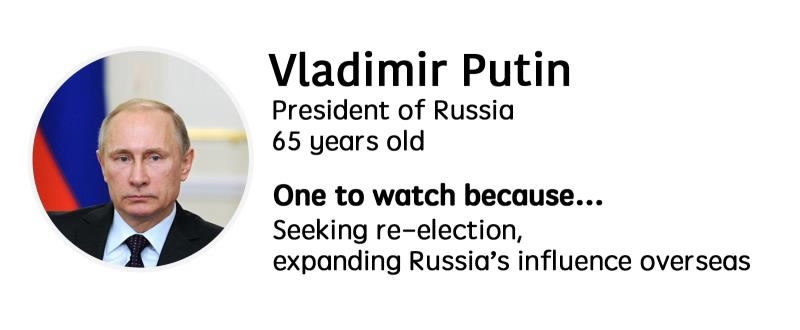
While far from a new player on the global stage, Putin took on a fresh role as mediator in the Syrian crisis in 2017, bringing the government and rebels together in search of a political solution. The 65-year-old is expected to continue to increase Russia’s influence overseas, and will have a busy year domestically with an election to compete in and a soccer World Cup to host.
1. Putin is expected to be re-elected for a new six-year term as Russian president in March, a victory he’ll hope to be celebrating when the World Cup kicks off in Moscow in June. The election campaign – and banned opposition leader Alexei Navalny’s call for a boycott and protests – could provide tests for the president.
2. Russian influence in Syria is likely to continue, with more Astana talks planned and a National Dialogue Congress to be held in Sochi, as well as two Russian military bases being expanded to give Moscow a permanent foothold in the Middle Eastern country.
3. Relations with Europe will also be in the spotlight, notably developments in eastern Ukraine and tensions along Eastern European borders, while the Mueller investigation into alleged Russian interference in the 2016 US election is expected to accelerate.
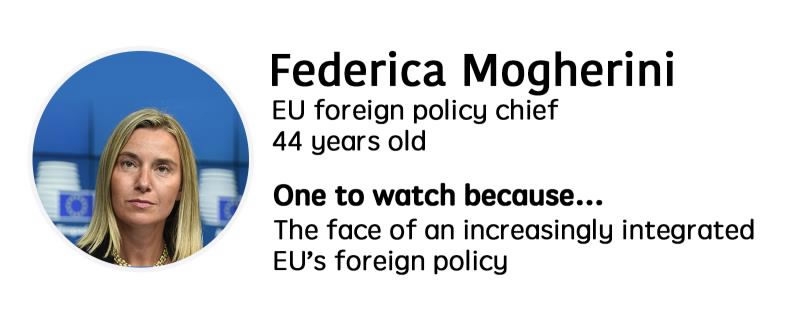
The former Italian foreign minister was seen as an inexperienced pick when named the EU’s foreign policy chief in 2014, but her profile soared last year as she attacked the US decision to recognize Jerusalem as Israel’s capital and the Trump administration’s criticisms of the Iran nuclear deal. She is a strong proponent of both the new EU defense pact and the bloc’s increasing focus on Africa.
1. Mogherini is a prominent defender of the Iran deal, and with the US increasingly hostile to the agreement she is likely to make headlines again when the option of “decertifying” is placed before Trump. She has previously said the US doesn’t have the power to veto the deal, struck between world powers and Iran in 2015, and vowed to fight to preserve it.
2. The 44-year-old has spoken out in favor of EU expansion, going as far as to say six West Balkan countries could join the bloc within the next two years. With a common defense force and a Macron-driven campaign for a more integrated EU, the foreign policy representative role will likely grow in 2018.
3. Mogherini has been critical of the situation in eastern Ukraine, where conflict intensified in the final months of 2017, but has also been accused by EU allies of taking too soft a line on Russia.
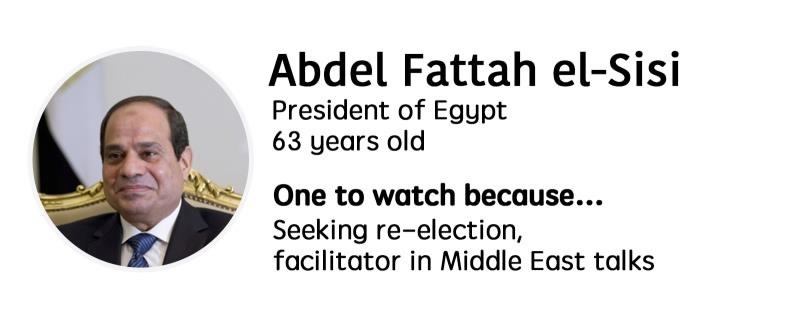
Sisi, the commander-in-chief of Egypt’s armed forces from August 2012 to March 2014, swept to power in a popularly-backed military coup in July 2013 against the country’s first elected president, Mohammed Morsi. Ten months later, Sisi was elected president of the Arab world’s most populous nation with 97 percent of votes in his favor.
1. Egypt will hold presidential elections in the first half of 2018. Though Sisi is yet to declare, he is widely expected to run for a second term, and win.
2. Sisi’s priority will remain fighting terrorism and boosting the economy. The country remains worried over the situation in Syria, Iraq, Palestinian territories and the growth of jihadists in the region, who find support from Egypt’s Muslim Brotherhood and other radical factions.
3. A major challenge for Sisi will be to maintain ties with the US. Egypt receives billions in aid from Washington, which has come under threat following Cairo’s decision to vote against the US on the UN resolution on the status of Jerusalem.
(Zhao Hong and Li Yueyun also contributed to this article.)

SITEMAP
Copyright © 2018 CGTN. Beijing ICP prepared NO.16065310-3
Copyright © 2018 CGTN. Beijing ICP prepared NO.16065310-3
